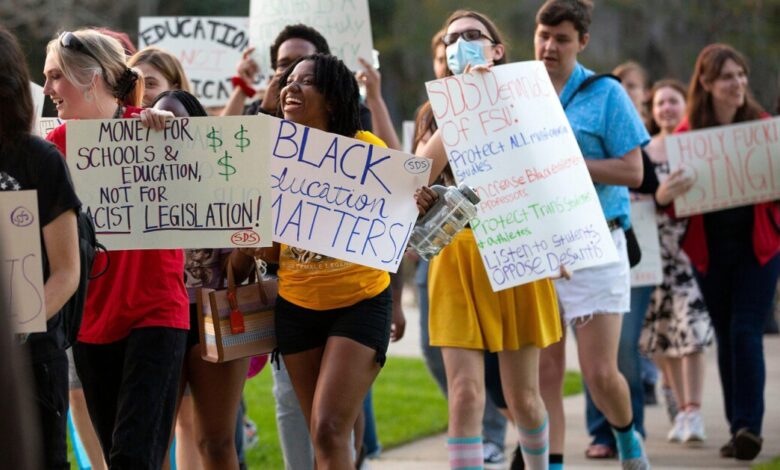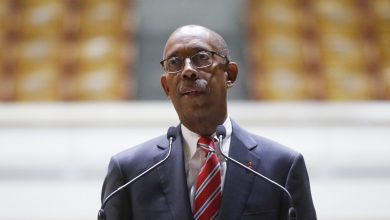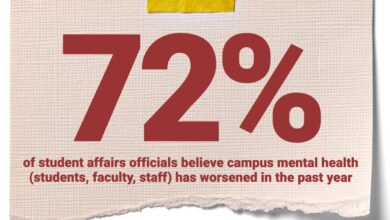As Politicians Target Higher Ed’s Diversity Efforts, HBCU Students Worry About Their Campuses

[ad_1]
As Gov. Ron DeSantis of Florida spearheaded a campaign this spring against higher ed’s efforts to create diverse and inclusive campuses, Florida A&M University students were among his most vocal critics.
Friday marked the end of a legislative session in which the state’s conservative politicians zeroed in on diversity, equity, and inclusion programs as pernicious forces that they believe must be eradicated from public colleges. This year and last year, the lawmakers also aimed to restrict teaching about race.
One of DeSantis’s priorities has been the sweeping higher-ed reform bill initially known as HB 999, which would restrict colleges’ spending on DEI programs and give the State University System’s Board of Governors more control over education on the system’s 12 campuses. That bill ultimately moved forward as SB 266 and passed the Legislature last Wednesday; DeSantis is expected to sign it into law.
If enacted, the bill would also ban course curricula and campus activities that “are based on theories that systemic racism, sexism, oppression, and privilege are inherent” in American institutions.
As many students at historically Black colleges and universities see it, the recent actions of DeSantis and other Republican politicians across the country diminish the plight of Black Americans, which directly affects HBCUs.
If it becomes illegal for colleges to promote diversity and inclusion, the students wonder, what consequences might that bring for Black institutions?
“I’m not surprised, but I’m disappointed,” said Lebaron Fields, a graduating senior at Florida A&M, of recent political developments in the state. Fields transferred to the historically Black university after one semester at Florida State University, the predominantly white institution just down the road.
Fields made a conscious decision to switch universities. In classes and campus activities at Florida State, he didn’t see many other Black students. He found solace at FAMU, where he felt Black identity was affirmed. Now he worries about what could happen to his alma mater.
“With the Trump era coming and going, I was hoping that HBCUs and Black spaces specifically were safe,” Fields said, “but with Ron DeSantis coming on the heel of Donald Trump, it’s eye-opening.”
A Semester of Protest
HBCU students who protested this semester said they aimed to send a message about what they saw as political attacks across the country on Black students and Black history.
“We won’t stand for social injustices,” said Sydney Aitcheson, president of Florida A&M’s NAACP chapter. “We will march until victory is won.”
Aitcheson made that comment in February, when hundreds of protesters, including FAMU students, joined the Rev. Al Sharpton in a march to the Florida Capitol.
The event was planned in response to DeSantis’s announcement that he would bar the state’s public schools from participating in the College Board’s new Advanced Placement course on African American studies.
DeSantis said the course’s curriculum “significantly lacks educational value,” described it as an example of “indoctrination,” and suggested that Black history shouldn’t be taught as a stand-alone course. The College Board announced last month that it would revise the course, amid criticism that DeSantis had pressured the organization to alter its content.
With the Trump era coming and going, I was hoping that HBCUs and Black spaces specifically were safe.
In March, as the Florida Legislature began debating the bill targeting diversity and inclusion efforts, a Democratic lawmaker raised the concern that its provisions could effectively shut down Black fraternities and sororities, a hallmark of the student experience at FAMU.
At the time, the legislation would have barred public colleges from spending any money “to promote, support, or maintain any programs or campus activities … that espouse diversity, equity, and inclusion or critical-race-theory rhetoric.” The bill’s author responded that it wasn’t intended to affect student groups.
That didn’t reassure FAMU students, who protested the legislation in late March outside a board meeting of the State University System. They were joined by students from Florida State, the University of South Florida, and New College of Florida. “Protect Black history,” proclaimed one of their signs. “Kill the bill,” read another.
Such bills “move beyond censoring what is in place in a classroom to trying to assert political control — partisan political control — over entire institutions and their governments,” said Jeremy C. Young, senior manager of free expression and education at PEN America, an advocacy group, during a panel discussion last month at the American Council on Education’s annual conference.
In the legislation, now known as SB 266, that passed both Florida chambers last week, some controversial provisions didn’t make the cut. Lawmakers removed language that could have shuttered women’s-studies programs.
References to “critical race theory” were also scrapped.
However, the revised text still states that public colleges would not be allowed to spend money “to advocate for diversity, equity, and inclusion, or promote or engage in political or social activism.”
Larry Robinson, FAMU’s president, has mostly stayed quiet on the legislative proposals targeting diversity and race. After his State of the University speech, in February, Robinson told the Tallahassee Democrat that the DeSantis agenda had not affected his campus.
I’m confident that our faculty will continue to deliver academic programs objectively and truthfully.
“I’m confident that our faculty will continue to deliver academic programs objectively and truthfully, as they have done throughout their careers and throughout our history,” he said.
Just before the New Year, DeSantis’s office requested information from Florida’s public colleges and universities on their diversity, equity, and inclusion programs and initiatives. FAMU reported spending about 1 percent of its budget on relevant activities, according to public records obtained by The Chronicle.
For some students, the experience of attending an HBCU like Florida A&M has highlighted the state’s lack of commitment to Black colleges.
Ashley Bigbee, a first-year student at FAMU from Georgia, said her experience exposed the stark reality of inequality in higher education between the predominantly white Florida State and the historically Black Florida A&M.
“My first month, two months coming here, it was a culture shock,” Bigbee said. “You really see HBCUs and the surrounding areas … you cross the street to go to FSU and they have everything.”
HBCUs and Opportunity
The beauty of attending historically Black institutions, for Black students, is that they are seen for who they are and allowed to be unapologetically themselves. HBCUs give Black students a seat at the table, offer them powerful connections, and prepare them to become leaders who can make a difference.
D’Marius Jones, a second-year student at Alcorn State University, in Mississippi, didn’t expect to attend college at all. His appreciation for his historically Black university is rooted in the reality of his past and his newfound hope for the future.
“I’m a young Black man, I come from an environment that isn’t promotable in the eyes of people that are not of color,” Jones said. “What they overlook is the very reason I am who I am today.” In contrast, Alcorn State students “don’t look at my outside appearances and judge me,” he said.
With his intricate tattoos and hair styled in freshly coiled twists, Jones was one of the first students I met during a trip this spring to Washington, D.C., where student journalists from HBCUs had been invited to attend a White House news briefing.
Jones and I shared our gratitude for having been given that opportunity as we waited outside the towering gates of the White House, which felt surreal. It didn’t matter what point someone was trying to make or what DEI initiative might have put us there; it mattered only that we were there.
If we were students at a predominantly white college, Jones said, “they would not look [our] way for opportunity.”
The event featured remarks by Vice President Kamala D. Harris, a graduate of Howard University. Students also asked questions of Keisha Lance Bottoms, a FAMU graduate and at the time President Biden’s senior adviser for public engagement.
I asked Bottoms about the administration’s response to state efforts aimed at restricting the teaching of Black history and DEI. She highlighted the federal government’s recent investments in HBCUs but noted that all the federal money in the world couldn’t stop state legislation. Bottoms encouraged young people to vote and get involved in local politics.
It’s not yet clear what effects HBCUs could face from bills like SB 266 if they’re enacted. A spokesperson at FAMU referred The Chronicle to the Florida Board of Governors.
Meanwhile, in other states that are home to HBCUs, politicians are using similar tactics to those in Florida.
Last month in Georgia, the lieutenant governor asked the state’s public universities — including Savannah State, Albany State, and Fort Valley State, all HBCUs — to submit reports detailing their diversity-related activities. In a letter Lt. Gov. Burt Jones wrote: “I share the concerns of various commentators and leaders of other states about the use of taxpayer funds by universities … for DEI programs.”
Tanya Miller, a Democratic state lawmaker, said in response that she was most worried about the potential effect on Georgia’s HBCUs.
“You cannot help but think that this is a targeted, potentially racialized attack against minority students in higher education,” Miller said. “And that is incredibly sad and incredibly disappointing.”
[ad_2]
Source link






